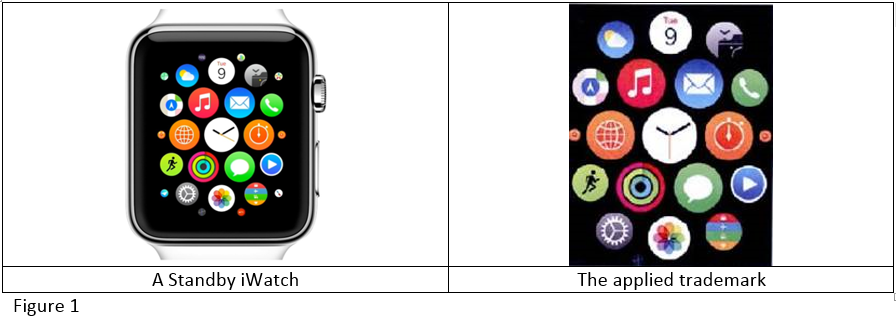A recent judgment by the Beijing IP Court has thwarted Apple’s attempts to obtain trademark protection for the standby screen of the iWatch! Apple may appeal this judgment.
On 13 November 2014 Apple had applied to file the sign depicted in Figure 1 as a trademark in China in classes 9, 10, 14, and 38. The four applications had been rejected by the Trademark Office for lacking distinctiveness. This decision has been affirmed by the Beijing IP Court.
The Beijing IP Court observed that the device is composed of several different small devices indicating specific functions of the product and rejected the trademark applications on the basis that the overall design is too complicated for consumers to recognize it as a trademark thus contravening Article 11(3) of the Trademark Law, the applied trademarks lack distinctiveness. Apple counter-argued that even if the device lacks distinctiveness, it has nevertheless acquired de facto distinctiveness through use.
It is indeed questionable whether such a device can be a trademark. The function of a trademark is to function as a badge of origin. In order to fulfill this “recognition” function, which also represents the economic value of the trademark embodied in the exclusive right of economic exploitation, the mark should be sufficiently original and distinctive. Correspondingly, the core premise of trademark law is about fair trading. In this spirit of fair trading, trademark law must ensure that the registration of a sign must not confer on any trader an unfair advantage. Consequently, trademark law prohibits the registration of any signs which are descriptive of the goods or services. The rationale for such a prohibition is simply to ensure that descriptive signs are allowed to remain in the public domain. After all, if the law were to give exclusive rights over descriptive signs to a particular trader, the pool of available words and symbols which other traders will likely want to use will be depleted. This violates all reasonable notions of fairness. This line of argument is neatly encapsulated in the Latin term – “publici juris”. It is thus this very concept of “publici juris” which forms the basis for the distinctiveness criterion in trademark law.
In rejecting the application, the Court focused on the device being too complex and composite to be recognizable as a trademark! The Court thus coined a novel argument- even if you had acquired distinctiveness, you are too complex a design for a consumer to recognize as a trademark, and thus the device does not fulfill a trademark function.
On the converse end of the spectrum, the Beijing First Intermediate People’s Court, in a 2010 decision rendered in an appeal brought by Audi AG against the TRAB, the Court affirmed TRAB’s decision rejecting the registration of the mark “A6” in class 12 for automobiles and its attendant accessories on the basis that such a mark is too simple and thus cannot function as a trademark.
Both these judgments are equally puzzling insofar as both Courts appear to introduce an additional criterion to Article 11(3) of the Trademark Law. This additional threshold is tremendously subjective and if adopted by subsequent courts, will inevitably lead to significant uncertainty in trademark registrations and brand management for traders in China.
Therefore, it is the authors’ opinion that one should go back to first principles in determining whether a mark has satisfied the distinctiveness threshold. Put simply, a mark should not be denied registration if it is capable of acting as a badge of origin. If a prima facie descriptive mark has acquired de facto distinctiveness, there would be no legal basis in denying its registration on the trademark register. The complexity or simplicity of the mark should not be part of the consideration for trademark registration.
Given the current state of the law, an alternative strategy would be to follow Apple’s lead and file design patents for seemingly complicated symbols.
Therefore, the take-away is for companies to take considered decisions to implement comprehensive IP strategies – leveraging on the full spectrum of the various IP protection regimes.
_____________________________
To make sure you do not miss out on regular updates from the Kluwer Trademark Blog, please subscribe here.



